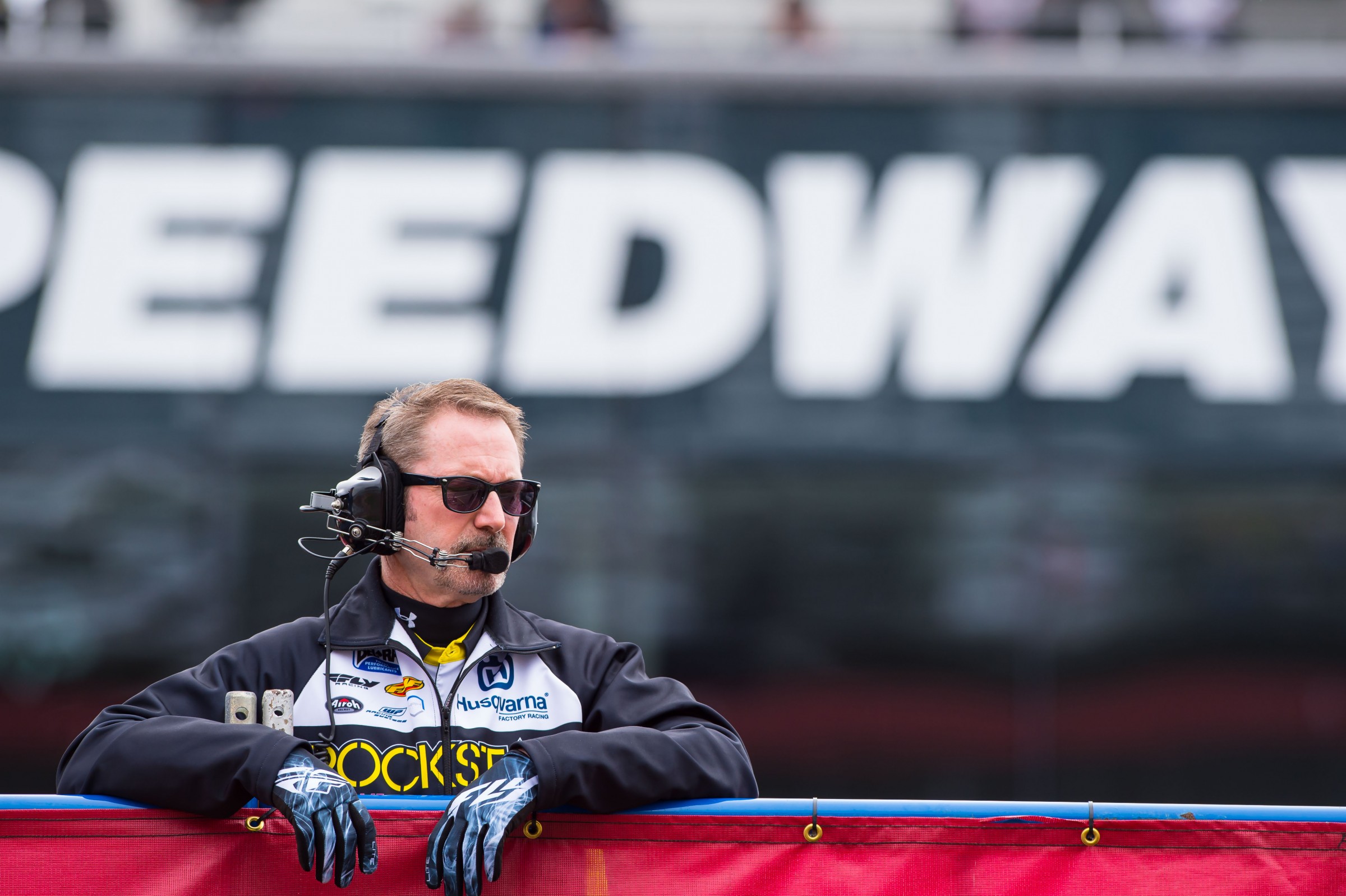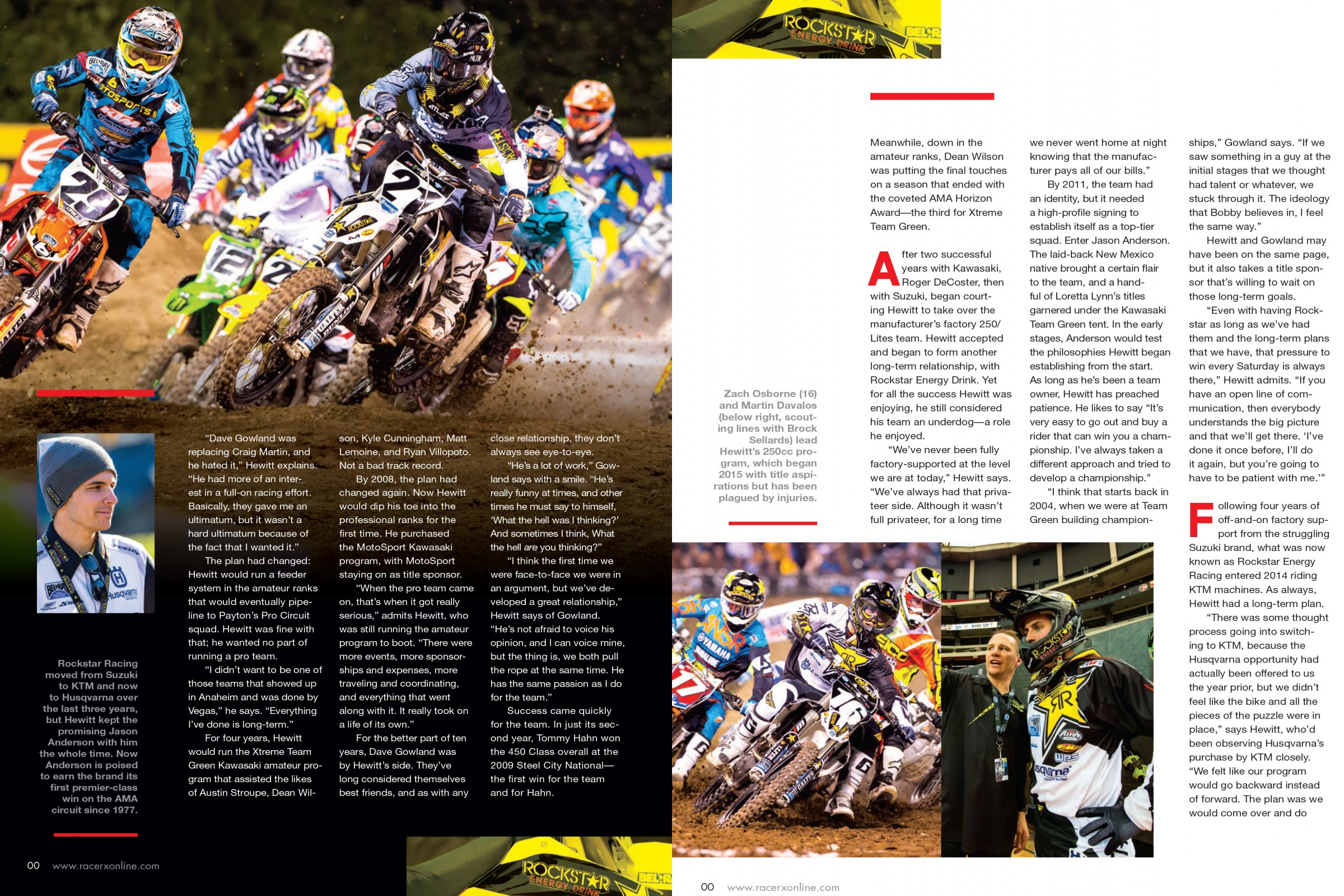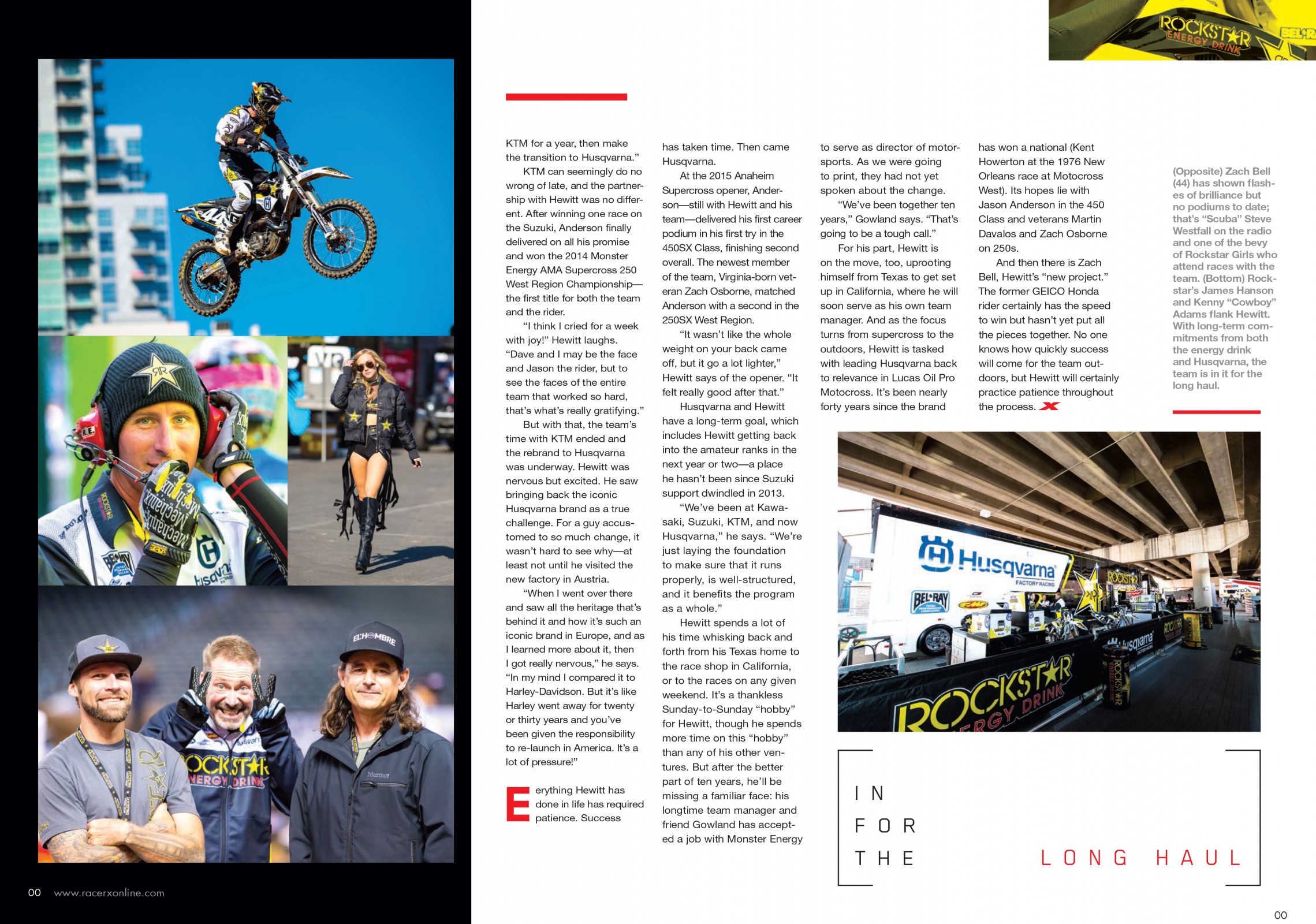This story originally ran in the July 2015 issue of Racer X Illustrated. Subscribe now for as low as $9.98.
Bobby Hewitt always told himself he would never go into the construction industry. He knew the highs and lows of the housing market all too well. As soon as he was out of diapers, he lived on construction sites every summer, and he hated every minute of it. His father, a general contractor, built high-rises and apartment complexes. Hewitt had no interest in the family business.
When, at age 18, his father gave him an ultimatum—“Go to school, work for me, or ride motorcycles”—Hewitt chose to attend nearby Baylor University and get a degree in marketing with a minor in business. But he’d soon realize he wasn’t fond of the coat-and-tie world of marketing, either.
“It drove me nuts,” Hewitt says of his graduate days. “I would sit in my little cubicle, and that lasted about 12 months. So one day, I just quit. I walked in and said, ‘I can’t do it anymore. I’m going into business for myself.’”
Hewitt, in his mid-twenties with a son and another on the way, quit his lucrative marketing job to dive into—you guessed it—construction. He wanted something that was easy to manufacture and would turn a quick dollar, so he began making countertops in his garage. But success didn’t come easy.
“I went from an $80,000 paycheck to $12,000 in that first year,” he says. “My wife [Karen] would babysit the kids in the neighborhood and we would have ten kids at our house at times. If she didn’t divorce me then, she was never going to.
After the first year, Empire Countertops began to grow. Today he has more than 150 employees in seven different markets. The new business wasn’t the first time Hewitt would have to adjust to change. In fact, his ability to recognize trends and capitalize on opportunity was something he brought from the business world to racing. Now he’s in both for the long haul.
* * *
Racing is a world with lots of empty promises. New teams will come in, throw around piles of money in hopes of buying their way to the top, then raise anchor a year or two after realizing how much it really takes to run a team. Those that have spent decades in the industry learn to be skeptical of newcomers. So when Hewitt started looking into starting his own team, some viewed him as an outsider looking to buy his way to the front.
“One of the first meetings I ever had with Mitch [Payton, Pro Circuit team owner], he goes, ‘You’re not going to come in here and buy your way into this industry,’” Hewitt recalls. “I told him, ‘I don’t plan on buying my way in. I plan on earning my way in. But today’s day one, so let’s get started.”
Hewitt’s journey in racing began like many—a son passionate about racing and a father willing to support him. Bobby’s son Hunter Hewitt was a top prospect a dozen years ago, but what started out as a family deal quickly turned into more. In 2004, Kawasaki Team Green’s Craig Martin approached the father with a simple plan: build a program where riders could travel together, share racing expenses, and have a place to park in the pits at big amateur races. But Hewitt would soon find out that not everyone was on board.
“Dave Gowland was replacing Craig Martin, and he hated it,” Hewitt explains. “He had more of an interest in a full-on racing effort. Basically, they gave me an ultimatum, but it wasn’t a hard ultimatum because of the fact that I wanted it.”
The plan had changed: Hewitt would run a feeder system in the amateur ranks that would eventually pipeline to Payton’s Pro Circuit squad. Hewitt was fine with that; he wanted no part of a running a pro team.
“I didn’t want to be one of those teams that showed up in Anaheim and was done by Vegas,” he says. “Everything I’ve done is long-term.”
For four years, Hewitt would run the Xtreme Team Green Kawasaki amateur program that assisted the likes of Austin Stroupe, Dean Wilson, Kyle Cunningham, Matt Lemoine, and Ryan Villopoto. Not a bad track record.
By 2008, the plan had changed again. Now Hewitt would dip his toe into the professional ranks for the first time. He purchased the MotoSport Kawasaki program, with MotoSport staying on as title sponsor.
“When the pro team came on, that’s when it got really serious,” Hewitt admits, who was still running the amateur program to boot. “There were more events, more sponsorships and expenses, more traveling and coordinating, and everything that went along with it. It really took on a life of its own.”
For the better part of ten years, Dave Gowland was by Hewitt’s side. They’ve long considered themselves best friends, and as with any close relationship, they don’t always see eye-to-eye.
“He’s a lot of work,” Gowland says with a smile. “He’s really funny at times, and other times he must say to himself, ‘What the hell was I thinking?’ And sometimes I think, ‘What the hell are you thinking?’”
“I think the first time we were face-to-face, we were in an argument, but we’ve developed a great relationship,” Hewitt says of Gowland. “He’s not afraid to voice his opinion, and I can voice mine, but the thing is, we both pull the rope at the same time. He has the same passion as I do for the team.”
Success came quickly for the team. In just its second year, Tommy Hahn won the 450 Class overall at the 2009 Steel City National—the first win for the team and for Hahn.
Meanwhile, down in the amateur ranks, Dean Wilson was putting the final touches on a season that ended with the coveted AMA Horizon Award—the third for Xtreme Team Green.
* * *
After two successful years with Kawasaki, Roger DeCoster, then with Suzuki, began courting Hewitt to take over the manufacturer’s factory 250/Lites team. Hewitt accepted and began to form another long-term relationship, with Rockstar Energy Drink. Yet for all the success Hewitt was enjoying, he still considered his team an underdog—a role he enjoyed.
“We’ve never been fully factory-supported at the level we are at today,” Hewitt says. “We’ve always had that privateer side. Although it wasn’t full privateer, for a long time we never went home at night knowing that the manufacturer pays all of our bills.”
By 2011, the team had an identity, but it needed a high-profile signing to establish itself as a top-tier squad. Enter Jason Anderson. The laid-back New Mexico native brought a certain flair to the team, and a handful of Loretta Lynn’s titles garnered under the Kawasaki Team Green tent. In the early stages, Anderson would test the philosophies Hewitt began establishing from the start. As long as he’s been a team owner, Hewitt has preached patience. He likes to say “It’s very easy to go out and buy a rider that can win you a championship. I’ve always taken a different approach and tried to develop a championship.”
“I think that starts back in 2004, when we were at Team Green building championships,” Gowland says. “If we saw something in a guy at the initial stages that we thought had talent or whatever, we stuck through it. The ideology that Bobby believes in, I feel the same way.”
Hewitt and Gowland may have been on the same page, but it also takes a title sponsor that’s willing to wait on those long-term goals.
“Even with having Rockstar as long as we’ve had them and the long-term plans that we have, that pressure to win every Saturday is always there,” Hewitt admits. “If you have an open line of communication, then everybody understands the big picture and that we’ll get there. ‘I’ve done it once before, I’ll do it again, but you’re going to have to be patient with me.’”
* * *
Following four years of off-and-on factory support from the struggling Suzuki brand, what was now known as Rockstar Energy Racing entered 2014 riding KTM machines. As always, Hewitt had a long-term plan.
“There was some thought process going into switching to KTM, because the Husqvarna opportunity had actually been offered to us the year prior, but we didn’t feel like the bike and all the pieces of the puzzle were in place,” Hewitt says, who’d been observing Husqvarna’s purchase by KTM closely. “We felt like our program would go backward instead of forward. The plan was we would come over and do KTM for a year, then make the transition to Husqvarna.”
KTM can seemingly do no wrong of late, and the partnership with Hewitt was no different. After winning one race on the Suzuki, Anderson finally delivered on all his promise and won the 2014 Monster Energy AMA Supercross 250SX West Region Championship—the first title for both the team and the rider.
“I think I cried for a week with joy!” Hewitt laughs. “Dave and I may be the face and Jason the rider, but to see the faces of the entire team that worked so hard, that’s what’s really gratifying.”
But with that, the team’s time with KTM ended and the rebrand to Husqvarna was underway. Hewitt was nervous, but excited. He saw bringing back the iconic Husqvarna brand as a true challenge. For a guy accustomed to so much change, it wasn’t hard to see why—at least not until he visited the new factory in Austria.
“When I went over there and saw all the heritage that’s behind it and how it’s such an iconic brand in Europe, and as I learned more about it, then I got really nervous,” he says. “In my mind I compared it to Harley-Davidson. But it’s like Harley went away for 20 or 30 years and you’ve been given the responsibility to re-launch in America. It’s a lot of pressure!”
Everything Hewitt has done it life has required patience. Success has taken time. Then came Husqvarna.
* * *
At the 2015 Anaheim Supercross opener, Anderson—still with Hewitt and his team—delivered his first career podium in his first try in the 450SX Class, finishing second overall. The newest member of the team, Virginia-born veteran Zach Osborne, matched Anderson with a second in the 250SX West Region.
“It wasn’t like the whole weight on your back came off, but it got a lot lighter,” Hewitt says of the opener. “It felt really good after that.”
Husqvarna and Hewitt have a long-term goal, which includes Hewitt getting back into the amateur ranks in the next year or two—a place he hasn’t been since Suzuki support dwindled in 2013.
“We’ve been at Kawasaki, Suzuki, KTM, and now Husqvarna,” he says. “We’re just laying the foundation to make sure that it runs properly, is well-structured, and it benefits the program as a whole.”
Hewitt spends a lot of his time whisking back and forth from his Texas home to the race shop in California, or to the races on any given weekend. It’s a thankless Sunday-to-Sunday “hobby” for Hewitt, though he spends more time on this “hobby” than any of his other ventures. But after the better part of ten years, he’ll be missing a familiar face: His longtime team manager and friend Gowland has accepted a job with Monster Energy to serve as director of motorsports. As we were going to print, they had not yet spoken about the change.
“We’ve been together ten years,” Gowland says. “That’s going to be a tough call.”
For his part, Hewitt is on the move, too, uprooting himself from Texas to get set up in California, where he will soon serve as his own team manager. And as the focus turns from supercross to the outdoors, Hewitt is tasked with leading Husqvarna back to relevance in Lucas Oil Pro Motocross. It’s been nearly 40 years since the brand has won a National (Kent Howerton at the 1976 New Orleans race at Motocross West). Its hopes lie with Jason Anderson in the 450 Class and veterans Martin Davalos and Zach Osborne on 250s.
And then there is Zach Bell, Hewitt’s “new project.” The former GEICO Honda rider certainly has the speed to win, but hasn’t yet put all the pieces together. No one knows how quickly success will come for the team outdoors, but Hewitt will certainly practice patience throughout the process.







